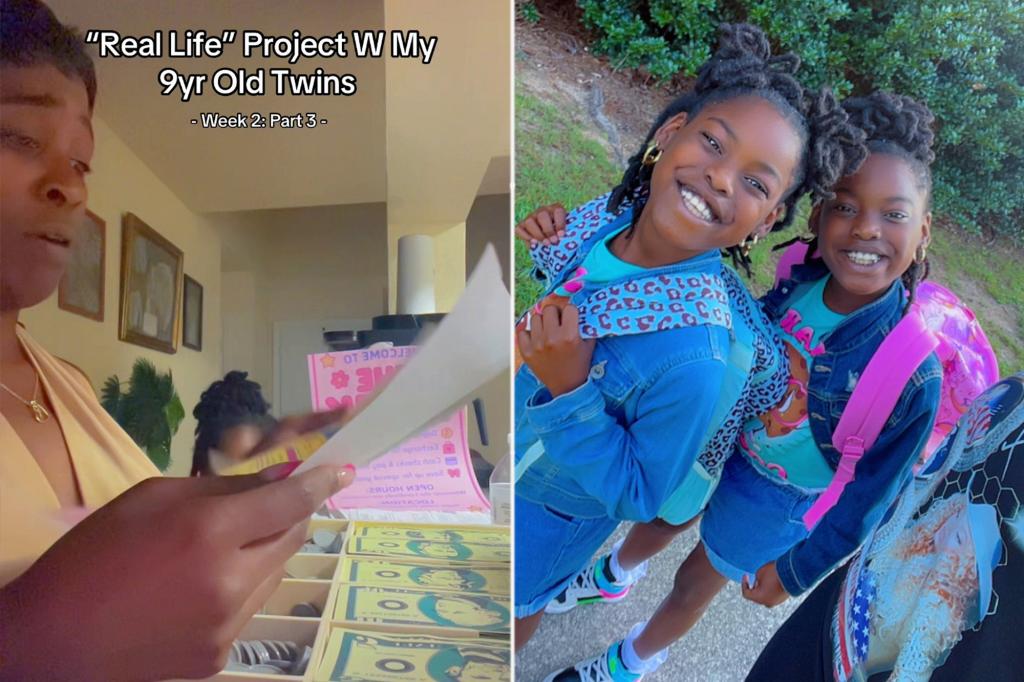Teaching Life Lessons Through Play: A Mother’s Innovative Approach to Financial Education
In the bustling city of Atlanta, 38-year-old LaToya Whitfield is taking an unconventional approach to parenting that’s catching attention. As both an HR recruiter and owner of a custom T-shirt business, LaToya understands the importance of financial literacy and responsibility. Rather than waiting for her nine-year-old twin daughters, Grace and Autumn, to learn these lessons the hard way in adulthood, she’s created a miniature economic system within their home that teaches real-world skills through play. What began as a response to her daughters’ requests for expensive restaurant meals has evolved into a comprehensive program that balances structure with nurturing guidance. “I don’t want to make it hard for them,” LaToya explains. “I just want to drop the seed inside of them for all of the lessons that they are learning during this time.” This thoughtful approach reveals a mother who’s focused not just on rules, but on planting ideas that will flourish as her daughters grow.
The catalyst for this domestic economy was a moment that many parents might recognize—children assuming money is limitless. When Grace and Autumn asked to dine at Benihana, an upscale Japanese hibachi restaurant, twice in a single week, LaToya saw an opportunity for education rather than simply saying no. When one twin questioned her mother’s finances with “Didn’t you just get paid?” LaToya recognized a teachable moment about how money really works. Instead of delivering a lecture that might go in one ear and out the other, she designed an experiential learning system. Using her creative skills, she developed a formal “lease” agreement and play currency, transforming abstract concepts into tangible experiences. This approach speaks to LaToya’s understanding that children often learn best through doing rather than hearing, especially when complex topics like financial responsibility are involved.
The system LaToya implemented mirrors real-world financial structures in a child-friendly way. Every Friday, the twins discover paychecks in their mailboxes, which they then cash at the household “bank”—a process that creates excitement while teaching banking basics. From these earnings, they must budget for essential expenses: $80 for rent, $10 for electricity, and $5 each for Wi-Fi and gas. This framework introduces concepts like recurring expenses and priorities in spending. The system isn’t just about payments, though—it includes consequences that, while serious-sounding, are actually quite gentle. If the girls fail to meet their financial obligations, they face “eviction” to the sunroom, playfully referred to as “the streets.” This space, far from being punitive, is actually a comfortable area of the home, demonstrating LaToya’s balance between teaching consequences while maintaining a nurturing environment.
Beyond the basic financial framework, LaToya has built in elements that teach broader life lessons about responsibility and incentives. The twins can be fined for not cleaning their rooms or bathrooms, or for failing to clean up after themselves in common areas—teaching them that neglecting responsibilities has costs. Conversely, they can earn bonuses for academic achievement and positive behavioral choices, particularly when they demonstrate effective conflict resolution with each other. This addition to the system is particularly thoughtful, as it teaches that earnings aren’t just about performing tasks but can also come from making good choices and investing in one’s future through education. The balance of potential penalties and rewards mirrors the reality of adult life, where both consequences and opportunities exist based on our choices.
What makes LaToya’s approach particularly effective is that it builds upon the foundation of capability she’s already instilled in her daughters. Grace and Autumn aren’t starting from zero—they already possess impressive self-sufficiency for their age. They can cook independently on a gas stove, thoroughly clean their bathrooms without supervision, and even take responsibility for tracking their own academic performance. These existing skills provide the confidence and competence necessary to succeed in the financial system their mother has created. By acknowledging and building upon their capabilities, LaToya reinforces their sense of agency while expanding their skill set. This approach stands in contrast to educational systems that assume children know nothing and must be completely directed, instead recognizing and honoring the abilities children have already developed.
The ultimate goal of LaToya’s creative parenting isn’t simply to create well-behaved children or to make her own life easier—it’s about equipping Grace and Autumn for successful futures. “I hope that this is something that will pop in their mind when they get older and they have to start making these decisions on their own,” she explains, revealing the long-term vision behind her methods. While some might question whether nine-year-olds need to understand rent and utility payments, LaToya’s approach provides a foundation of financial knowledge that many young adults lack when first living independently. By making these concepts accessible through play now, she’s potentially saving her daughters from costly mistakes later. Perhaps most importantly, she’s creating memorable experiences that blend education with family bonding. “I am hoping that not only they will learn, but that they will remember this experience forever,” LaToya shares, highlighting that the true value lies not just in the lessons themselves, but in the loving context in which they’re delivered.















